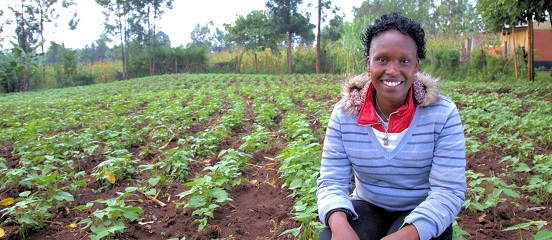The new winner of the World Food Prize, President of the Africa Development Bank, Dr Akinwumi Adesina has made a timely call to change the lenses with which we look at agriculture.
As Chief Executive of Farm Africa, an organisation dedicated to overcoming poverty by unleashing African farmers potential to grow their incomes in an environmentally sustainably way, I back Dr Adesinas calls to treat agriculture as a business.
The new winner of the World Food Prize, President of the Africa Development Bank, Dr Akinwumi Adesina has made a timely call to change the lenses with which we look at agriculture.
As Chief Executive of Farm Africa, an organisation dedicated to overcoming poverty by unleashing African farmers potential to grow their incomes in an environmentally sustainably way, I back Dr Adesinas calls to treat agriculture as a business.
Making farming in rural Africa profitable can offer multiple benefits: livelihoods for the quickly growing numbers of young people who live there, global food security, a higher quality of agricultural produce for consumers and a well-managed natural environment.
Outsourced supply chains
The call for private sector involvement in African agriculture is one that is becoming increasingly urgent.
For too many years, the international private sector has taken a hands-off approach to engaging with African farmers. While British retailers boast impressive knowledge of the provenance of milk, poultry and cereals they source domestically, the same cannot be said of the food they buy from Africa.
Over the last 50 years or so, international retailers have increasingly outsourced management of value chains of tropical products such as cocoa and sugar to traders, and have thereby lost direct contact with the farmers producing those products.
Rising demand for food
In the UK, a growth in consumer demand that outstrips rises in domestic production means a higher level of food imports is inevitable. British self-sufficiency has fallen from 75% in 1991 to 61% in 2016 and is projected to fall to under 50% by 2040.
As imports rise, its time for international food companies to reclaim management of their value chains and directly engage with the producers of the food they sell. Consumers deserve to trust the supermarket cocoa they buy just as much as the supermarket milk.
Poor quality, yields and profits
The quality of agricultural produce in Africa, meanwhile, has lagged behind its potential, meaning that farmers have not been able to capture the attention of high-value private sector buyers, and have instead sold sub-par produce at low prices at the farm gate.
With disappointing profits and yields across rural Africa yields are estimated to be only a quarter of their potential - many small-scale farmers put in a whole lot of hard work for little reward. And while the older generation continues to persevere with the only job theyve ever known, farming is being increasingly spurned by many young people in rural Africa.
Yet, jobs for young people in rural Africa are needed now more than ever. The population in sub-Saharan Africa is rapidly growing and by 2035 the number of Africans joining the working age population (15-64) will exceed that from the rest of the world combined. The IMF estimates that the region will need to create about 18 million new jobs per year until 2035 to absorb the growing workforce.
Fixing Africas food sector
Employing more than 52% of people, the agriculture sector is Africas largest employer. By fixing Africas food sector, we can create those much needed jobs for young people and meet a sharply rising demand for food.
Making Africas food system functional is dependent on making farming profitable, which in turn is dependent on linking small-scale farmers to markets.
Growing Futures
Farm Africas Growing Futures project in western Kenya is an example of a collaboration that does just that. Funded by the retailer Aldi UK, Growing Futures trains young farmers living in poverty in how to grow high-quality horticultural produce such as French beans, cabbages and mange touts, and sell them in bulk to export companies such as VegPro.
Its time for civil society, governments and the private sector to work together to develop more traceable value chains that lift Africas rural youth out of poverty and provide global consumers with the variety of high-quality products they demand, while protecting the environment for years to come.
As Dr Adesina points out: Africa produces 75% of the worlds cocoa beans but earns only 2% of the $100 billion annual global market for chocolates.
When private sector buyers engage directly with small-scale producers across rural Africa to buyers, there is huge potential for farmers to command higher prices and escape poverty. Higher profits will enable more investments in driving up the quality and quantity of their agricultural products, something that benefits private sector food companies and consumers alike.
Find the original article published at Farm Africa's website.

